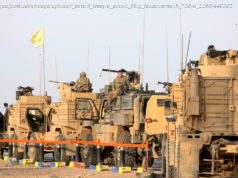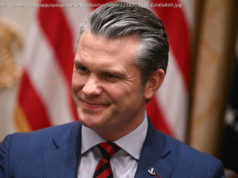Tensions in the country have been building since the shock dismissal of Prime Minister Ranil WickremesingheBodyguards for cabinet minister opened fire on Sunday, killing a 34-year-old man
A constitutional crisis gripping Sri Lanka since the president’s shock dismissal of Prime Minister Ranil Wickremesinghe erupted into violence Sunday, with a man shot dead and two others injured in Colombo.
Police said bodyguards for a Sri Lankan cabinet minister allied to Wickremesinghe opened fire inside a government ministry as a mob loyal to President Maithripala Sirisena besieged the minister’s office. Three people were injured but a 34-year-old man died shortly after.
Wickremesinghe has refused to vacate the prime minister’s official residence, barricading himself inside as over 1,000 supporters, including chanting Buddhist monks, rallied outside.
The 69-year-old says his sacking is illegal, and wants an emergency session of parliament held to prove he still commands a majority.
Sirisena shut parliament for nearly three weeks to forestall any challenge to his appointment of Mahinda Rajapakse, a former president accused of wartime abuses.
Rajapakse sought blessings at a prominent Buddhist temple Sunday as he jostled to consolidate his claim to the prime ministership.
But Wickremesinghe got a boost as Sri Lanka’s parliamentary speaker refused to endorse his sacking.
Speaker Karu Jayasuriya backed Wickremesinghe’s request to retain his privileges and security until another candidate could prove a majority in parliament, saying it was “democratic and fair”.
He also warned the president that shuttering parliament risked “serious and undesirable consequences for the country”.
Opposition leader Rajavarothiam Sampanthan urged Jayasuriya to summon parliament immediately.
“I hereby call upon yourself to uphold the rule of law by summoning parliament… to perform its legitimate functions,” said Sampanthan, who represents Sri Lanka’s minority Tamil community.
Officials loyal to Rajapakse said police will now seek a court order to evict Wickremesinghe from the residence, threatening to escalate the stand-off.
Soldiers had been stationed near the residence, although Wickremesinghe’s security and official cars were withdrawn Saturday.
Tensions were high across Colombo, with police leave cancelled amid warnings street violence could break out if the president did not immediately summon parliament to end the impasse.
“Don’t try to create a civil war in this country,” party legislator Karunarathna Paranawithana told reporters at the prime minister’s residence.
Regional neighbours and Western nations have urged all sides to exercise restraint and respect the constitution.
But violence broke out inside the petroleum ministry as police guarding Minister Arjuna Ranatunga fired on a mob surrounded his office.
Witnesses saw Ranatunga, 54, also a former World Cup winning cricket captain, rushed from the scene in a tactical helmet and body armour by police commandos.
In his first televised address to the nation since the crisis began, Sirisena said Sunday he sacked Wickremesinghe over personal and political disputes.
“Apart from our ideological differences, we also had serious cultural differences,” Sirisena said, referring to Wickremesinghe’s liberal background and his own rural conservative upbringing.
He said he had no choice but to appoint Rajapakse, and urged parliament to support him.
Loyalists of Rajapakse – whose controversial decade-long rule was marked by grave allegations of rights abuses, the crushing of the Tamil Tiger uprising, and growing authoritarianism – were appointed Sunday to run the country’s two state-run television channels and a newspaper.
Plans to appoint some cabinet members had been delayed until Monday, aides said. Rajapakse is yet to make a formal statement since being elevated to the new post.
The strongman is seen as being closer to China than Wickremesinghe, who had sought to re-establish stronger ties with traditional ally and regional power India.
New Delhi said it was “closely following” events in Colombo.
The United States and European Union ambassadors have called on the Sri Lankan rivals to follow the constitution and avoid violence.
Privately-run newspapers on Sunday described Sirisena’s move as a “constitutional coup”.
However, Rajapakse loyalist and former foreign minister G L Peiris said there was nothing illegal about Wickremesinghe’s dismissal.
The falling-out between Wickremesinghe and Sirisena has come to a head since the president this year backed a no-confidence motion against the man he had hand-picked to lead the government.
The two allied against Rajapakse in the 2015 election, but their relationship steadily soured.
Sirisena initially said he would be a one-term president but has since indicated he will seek re-election next year – pitting himself against Wickremesinghe who also has presidential ambitions.
This is the second time that a president has ousted Wickremesinghe from office. In 2004, the then head of state sacked him and called snap elections.
After winning the premiership in August 2015, Wickremesinghe amended the constitution to remove the president’s power to sack prime ministers to prevent a repeat of his earlier ouster.






